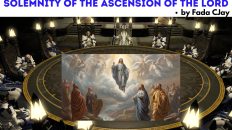official answered, how can I understand, unless someone guides me? So he
invited Philip to sit with him in his carriage” (Acts 8:31)
age (milieu) is filled with “prosperity-gospel” preachers, resulting from
uneducated minds, misinterpretation of the Scriptures, and the drive for money
possession, etc… This rests on what I call “bible reading abuse”. Many people
no longer read the Bible with the spirit of the “Call to Discipleship”; they
read the Bible and interpret it in a way that suits their selfish situations
and all that… Let us remember that Christ has said: “if anyone wants to
follow me, he must deny himself, take up his cross and follow me” (Matt.
16:24). This is indeed the obligation of a true disciple of Christ.
Bible is God’s Word in human writings, and thus reverence and respect should be
accorded to it while reading it. It should be read within the confines of the
Church’s Teaching Office and Authority (Magisterium). In the era of the
Apostles, the Bible was taught and explained from a “Standard” (Tradition). The
experience of the Ethiopian eunuch and Philip gives a proof to what we are
talking about.
are a number of ways to read the Bible. One of the first things is to begin
with Prayer. Catholics should look for a Catholic Bible (The New Jerusalem
Blible, Good News Bible, African Bible, Catholic Community Bible, etc).
However, what we should look for is good footnotes at the bottom of the page
that are indexed to other similar texts in the Bible. This helps the reader to
understand the particular verse in context, rather than reading in “isolation”.
The Bible is meant to be read properly and never to be taken out of context.
That is what satan tried to do to Jesus in the desert in Matthew 4 – Taking
individual verses out of context, trying to use them to mean something they
really don’t. (That method is still used today, by well meaning, but misguided
Christians).
By using the footnotes at the bottom of the page, you can turn to a similar
verse and see how it is used. Another rule to follow is that you must read the
bible with a sense of Tradition, what the original author meant to say, not
what you think it means. For this reason, I will introduce you to the Senses of
the Scriptures:
are 4 basic senses (levels) of scripture to understand:
sense, the moral sense, and the anagogical sense.
literal sense is what most people stop at when they read the bible. The literal
sense is when one reads about a temple in the bible, about its big structure
etc. where everyone went to worship. This is what the Pharisee thought that
Jesus was talking about in John 2 when Jesus said “Destroy this temple and I
will rebuild it in 3 days.” However, Jesus was talking about the allegorical sense (how the text refers
to Jesus) and the fact that His Body is the new Temple.
moral sense of scripture is how the verse applies to us and our personal
morality. Since the bible says that our bodies are temples for the Holy Spirit
in 1 Corinthians 6, then we should not spend one second desecrating our temple
by getting drunk, watching impure movies, having an abortion, cursing, etc. The
desecration of the temple is what started the whole Maccabean revolt in 1
Maccabees.
last method, the anagogical sense, refers to the heavenly sense. We know that
after the second coming there will be a new heavenly temple (Revelation 21),
and the old earth and all of its churches and temples will pass away.
The average bible reader will be very enriched if they concentrate on the moral
sense – How the bible verse applies to you personally. For example, when Mary
presents the Baby Jesus to God the Father in the Temple (Luke 2), are you
personally ready for Mary to present you to God the Father? When Mary and Joseph
lose Jesus and find Him in the Temple (Luke 2), do you seek out Jesus in the
Blessed Sacrament in the Church when you feel lost and forsaken? When Jesus was
covered by his own blood and sweat following the crowning with thorns at his
passion, do we realize how sinful thoughts in our own head blind us to the
saving power of Jesus’ blood and the water from His side at the cross? The list
is endless.
last, we should never put our own personal interpretation on scripture, unless
it agrees with the Tradition of the Catholic Church. St. Peter himself warns
against this practice in 2 Peter 1 and 2 Peter 3.
It might interest us to note that the Bible did not descend from the sky as a single book. It derives it’s name from the Greek work “Biblia” (βιβλία ), meaning a collection of books. It was the Church that actually gathered the written manuscripts which passed through a processed called “canonization” (acceptance); meaning that some books were canonized and others were not…and that is how we have the Bible as a single unit today. Besides, there existed the Oral Tradition which was being transmitted by the early Church for some time before the compilation of the written texts which we all know as Bible today. Not all the aspects of the Oral Tradition were put into writing. All these remain in the custody of the Church.
Someone might ask: How do we know that the Church is authorized to teach?
The Magisterium is simply the authority handed down by Christ to his eleven disciples after the resurrection. He said: “Go therefore, make disciples of all nations….and TEACH them to observe ALL the commands I gave you…” (cf. Mtt. 28:19-20). The apostles handed this mandate down to the present day leaders of the Church. This is what we call the “Apostolic Succession” How do I mean? The doctrine of apostolic succession is the belief that the 12 apostles
passed on their authority to successors, who then passed the apostolic
authority on to their successors, continuing throughout the centuries, even
unto today. The role of apostolic
succession in preserving true doctrine is illustrated in the Bible. To make
sure that the apostles’ teachings would be passed down after the deaths of the
apostles, Paul told Timothy, “What you have heard from me before many
witnesses entrust to faithful men who will be able to teach others also”
(2 Tim. 2:2). In this passage he refers to the first three generations of
apostolic succession—his own generation, Timothy’s generation, and the
generation Timothy will teach. Look at 1Timothy 1:6 and 4:14, where Paul reminds Timothy that the office of
bishop had been conferred on him through the laying on of hands. Notice in 1Timothy 5:22 that Paul
advises Timothy not to be hasty in handing on this authority to others. In Titus Paul describes the apostolic authority Titus had
received and urges him to act decisively in this leadership role.
Therefore, we are called to learn from the teachings of the Leaders of the Church; that is why I said that the Magisterium (the Teaching Office and Authority of the Church) is needed to interpret Scripture.




